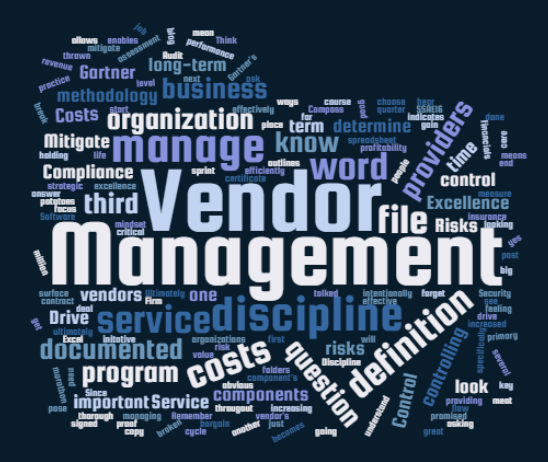Vendor Management is a term that is thrown around all the time, but what does it really mean? If we look at it on the surface, it is a method for managing your vendors and third party service providers. That's a little obvious of course, but let's look at the definition of Vendor Management from Gartner to see what they have to say about it:
"Vendor Management is a discipline that enables organizations to control costs, drive service excellence, and mitigate risks to gain increased value from their vendors throughout the deal life cycle."
That is a great definition that outlines several key components that we are going to break down further so we can first understand the components of Vendor Management and why an organization should care:
- Vendor Management is a Discipline - The word discipline is a very important word in this definition. Gartner doesn't say that it is a "practice" or an "initiative", rather they intentionally use the word discipline. The word discipline indicates a long-term methodology and mindset on how to manage your vendors. Think of this as a marathon, not a sprint!
- Control Costs - This is a term that we hear in business all the time. We need to control costs. Our primary focus this quarter is controlling costs. Why is this important? Did you know that controlling costs is far more effective than increasing revenue when looking specifically at profitability? Having a Vendor Management program in place allows an organization to effectively and efficiently manage their third party providers
- Drive Service Excellence - Let me start this one by asking a question: Are your vendors doing a good job for you? Most people will answer yes, but how do you know this? Is this just a feeling that you have or do you have documented proof that they are holding up their end of the bargain? By having a documented, strategic Vendor Management program, you can ultimately measure your vendor's performance to determine if they are providing the level of service they promised when you signed the contract with them.
- Mitigate Risks - Since Compass IT Compliance is an IT Security, Audit, and Compliance Firm, this is a big one for us. Let me ask another question: Do you know what risks your vendors pose to you and your business? Do you have an insurance certificate on file? Do you have a copy of their SSAE16 on file? Do you have their financials on file? Have you done a thorough risk assessment to determine how critical the service they provide is to YOUR business?
Now we get into the meat and potatoes of the blog post. We have broken down the component's of Gartner's definition and why these are important. The next question becomes, how do we manage it? Remember, we talked about Vendor Management being a discipline which means a documented, long-term methodology on how we manage third party providers. There are a million ways to manage your vendors, from an Excel spreadsheet to file folders to a Vendor Management Software program. Ultimately what you choose to use is up to you and your organization but don't forget why this is important: Control Costs, Drive Service Excellence, and Mitigate Risks.



Comments (2)